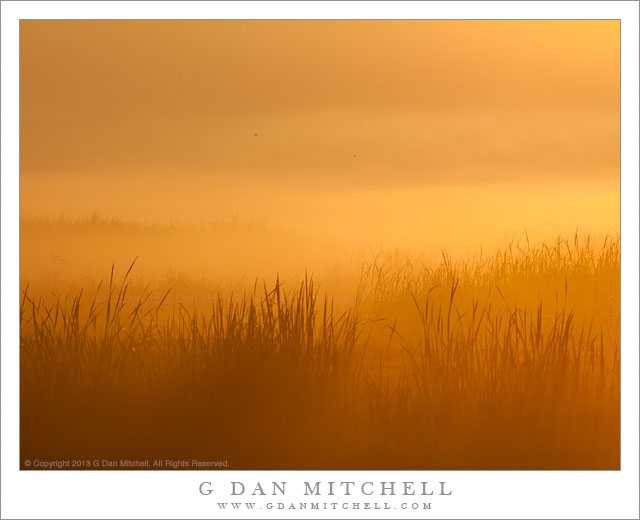(I’ve added a brief update at the bottom of the original article.)
After thinking about it for some time, this week I acquired the Canon EF 100-400mm f/4.5-5.6 L IS lens. I’m not always necessarily that much of a “big lens” guy, and for the most part I’m very happy shooting with my Canon EF 17-40mm f/4 L and my Canon EF 24-105mm f/4 L IS, sometimes using my EF 70-200mm f/4 L for longer shots. (More about these lenses and other equipment I use on my Equipment: Reports, Tests, And Commentary page.) But during the past year I have been unable to shoot several specific subjects the way I wanted because I just didn’t have long enough range.

I avoid making purchases driven by Lens Lust. I wait until I identify a specific gap in what I can do with my equipment and specific ways to resolve this before I get out my credit card. I do not buy gear because I have extra money, because it looks shiny and cool, or because I happen to have some extra cash. In this case I knew that the lens would primarily be used on a tripod, though sometimes used hand held; that any low light shooting with the long lens would almost certainly be on the tripod; that excellent resolution would be important; that flexibility would also be important; that the lens would fit into a system of existing lenses; and that I prefer to have lenses whose focal length ranges overlap.
Eventually the choice came down to this lens or the Canon EF 300mm f/4 prime. (The f/2.8 version of the latter focal length was out the question for me – not just because of the extraordinarily high price but also because I wouldn’t need f/2.8 in such a lens and because the extra weight and bulk are significant.) The 300mm lens seems like a really wonderful optic. For shooting at 300mm it would seem to be better than the zoom in a couple ways: slightly better resolution perhaps and one additional stop. That lens also works fairly well with the Canon 1.4x teleconverter, achieving 420mm at f/5.6 with image quality slightly degraded but still competitive with the zoom at its maximum focal length. If my circumstances were a bit different I could well have chosen this lens.
In the end several things caused me to go with the zoom. First, for much of the photography that I do the composition/framing flexibility of a zoom is tremendously valuable. Second, while the prime picks up a bit of resolution at 300mm over the zoom, the difference is very small – insignificant in virtually all cases. Third, the small aperture advantage provided by the prime is not so significant for my photography since the majority of the long lens work is done at smaller apertures. Additionally, f/4 “advantage” of the prime at 300mm evaporates when the TC is used to get it to 420mm. Fourth, while the zoom is not exactly a svelte lens, it is shorter than the prime when packed.
UPDATE 5/17/08: Having shot this lens for several months now I can offer a a bit more information. (Though I still haven’t put it through my standard test procedure… still to come.)
As I wrote above, I originally considered this lens and the EF 300 f/4 L. I chose the zoom over the prime for reasons described above, though I can see how another photographer might make the opposite choice – both are fine lenses.
One additional thought did occur to recently. The 300mm prime is no doubt measurably (though perhaps rarely visibly) sharper than the 100-400 lens at 300mm. So if you needed the best possible IQ at 300mm then the prime could well be your choice. However, if you need to crop the 300mm lens’ image to a bit narrower angle of view, you will lose some or all of that IQ advantage. It seems to me that, for example, the IQ of an uncropped 100-400 photograph shot at 350mm is going to be as good or better than a cropped 300mm photograph taken with the prime.
Related:
- Thoughts About Long Zooms and Primes and ‘Image Quality’
- Thoughts About the Canon 100-400mm f/4.5-5.6 L IS Lens
If this article helped you make a purchase decision, please considering purchasing your Canon 100-400mm f/4.5-5.6L IS lens from B&H Photo though this link and helping support this blog. Thanks!
© Copyright 2008 G Dan Mitchell – all rights reserved.
 G Dan Mitchell is a California photographer whose subjects include the Pacific coast, redwood forests, central California oak/grasslands, the Sierra Nevada, California deserts, urban landscapes, night photography, and more.
G Dan Mitchell is a California photographer whose subjects include the Pacific coast, redwood forests, central California oak/grasslands, the Sierra Nevada, California deserts, urban landscapes, night photography, and more.
Blog | About | Flickr | Twitter | Facebook | Google+ | 500px.com | LinkedIn | Email
Text, photographs, and other media are © Copyright G Dan Mitchell (or others when indicated) and are not in the public domain and may not be used on websites, blogs, or in other media without advance permission from G Dan Mitchell.
Discover more from G Dan Mitchell Photography
Subscribe to get the latest posts sent to your email.
